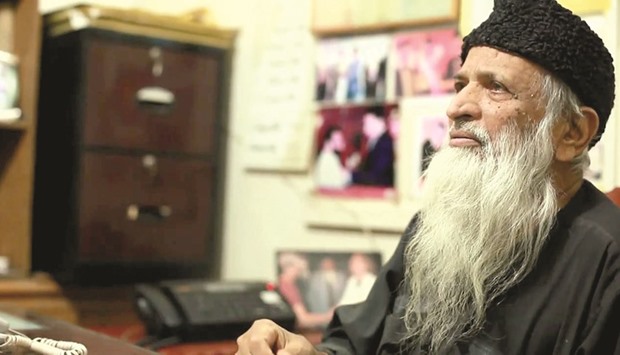Members of Pakistani community living in Qatar gathered in large numbers to offer collective prayers for Abdul Sattar Edhi, a prominent Pakistani philanthropist who died in Karachi Pakistani due renal failure earlier this month.
The 88-year-old Edhi, often referred as ‘Pakistan’s Father Teresa’ or ‘Angel of Mercy’, started his welfare and charity work six decades ago and established one of the biggest networks of social welfare in Pakistan under Edhi Foundation.
The foundation now owns and runs Pakistan’s largest ambulance service, nursing homes, orphanages, clinics, women’s shelters, rehabilitation centres and soup kitchens across the country. Revered for his honest and dispassionate charity work, Edhi was honoured with a state funeral held at Karachi’s national stadium attended by most of Pakistan’ ruling elite.
Dozens of local Pakistani community members gathered at the Pakistani embassy to participate in the collective prayers for Edhi on Friday, organised by the Pakistan Welfare Forum (PWF). The prayers were led by Hafiz Junaid Amir Sial, the community welfare attaché at Pakistan embassy, and were attended by Pakistan ambassador Shahzad Ahmad, among others.
“He was a great personality of this century who lived his entire life in the simplest of ways and at minimum resources one cannot even imagine,” Riyaz Bakali, PWF president, told Community.
“His organisation is doing marvellous work in the way that they are doing what the state was supposed to do; and their work did not stop even on the day when the entire nation was mourning his death,” said Bakali, adding Edhi was a supreme example of simplicity while he worked like a ‘superhuman,’ helping the injured while bullets were being exchanged in his city.
Edhi was popular for his humble style and only owned two sets of clothes and lived in a windowless room next to his small office in a Karachi slum. His foundation was entirely run on people’s donations and he rejected multiple offers for help from government and politicians.
In a final act of modesty, he insisted on and was buried in the clothes he died in. He also offered his organs for donation, although only his cornea was healthy enough for transplantation, which were later successfully transplanted on a young boy to rehabilitate his eyesight.
“I met Abdul Sattar Eidhi in November 2010 with delegation of three persons from PWF Qatar when Interior Sindh (province of Pakistan) was flooded from Badin to Mirpur Khas (cities). I found him very simple and a humble down to earth person,” recalled Tahir Jamil, a long-time Doha resident and President of Pakistan Engineers Forum-Qatar.
“He told us people were coming to him with suitcases full of money and the keys to their houses to donate for poor people because they trusted him. He was a very good and very strict administrator,” said Jamil.
His death is a great loss for Pakistan, he added, saying Edhi spent all his efforts helping orphans, the destitute and the needy. “He will always remain in our hearts. We will never forget him. There was only one Edhi,” said Jamil.
Praising Edhi’s work, another prominent member of Pakistan community and the former president of PEF-Q, Asfandyar Ansari said Abdul Sattar Edhi envisioned a mission impossible but made it possible through his dedication, sincere and humble efforts.
“Started with driving an ambulance, Edhi ended up running the world’s largest ambulance fleet. From giving one unwanted baby his name to adopting thousands of such abandoned children, Edhi kept working till his death,” said Ansari.
“He is a role model for all welfare workers who also envision the impossible. He left behind a legacy that would keep piling his good deeds higher than Everest,” he added, while commenting on Edhi’s personality.
Speaking about the legendary social worker, Adeel Akbar, the general secretary of Pakistan Arts Society-Qatar, said Abdul Sattar Edhi was truly a generous human being.
“He is a great example of someone who served humanity without discriminating on colour, creed or religion and established distinctive services. Edhi saved hundreds of lives through his humanitarian efforts and was a true asset to the country,” said Akbar, adding that Edhi’s contribution to social welfare is irreplaceable and his efforts will always be remembered.
Edhi’s body was wrapped in Pakistan’s green and white flag and was honoured with a gun salute by the army after which he was buried at the Edhi Village, a shelter on the outskirts of the city for the mentally ill, older people and abandoned women.

ROLE MODEL: Edhi led a simple life, owning just two sets of clothes and living in a small room beside his office.
